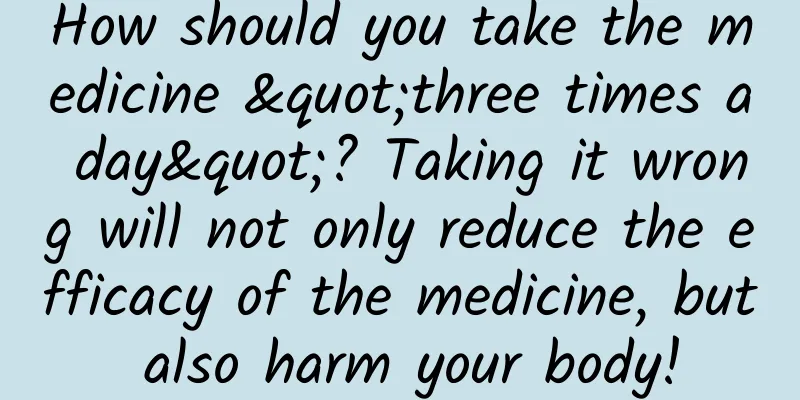How should you take the medicine "three times a day"? Taking it wrong will not only reduce the efficacy of the medicine, but also harm your body!

|
When we go to the doctor or buy medicine, we often hear the doctor's advice to take it "three times a day", but have you ever thought about how to take it "three times a day"? Should we take it at any three times a day, or after three meals, or... Let's explain it to you today! 01 Failure to pay attention to the interval between medications may aggravate the symptoms Many people do not pay attention to the interval between medications, thinking that as long as they can remember to take the medicine every day, they are very casual about the timing of medication, sometimes early, sometimes late, and even often forget. In fact, how quickly your illness recovers has a lot to do with whether you take the medicine correctly. In medical medication, the interval between medications for each drug is scientifically based, and it is determined based on the kinetics of drug metabolism in the body. This medication interval is the best solution determined after repeated clinical trials, so that the drug always maintains a relatively stable state in your body. Generally speaking, unless it is a sustained-release or controlled-release dosage form, if the drug needs to maintain a certain concentration in the body at all times, then the doctor will choose to take the medicine three times a day , such as the most common antibiotics and some painkillers, which can maintain a stable bactericidal effect in your body or help relieve pain. The reason why doctors only ask you to take some medicines once a day, 24 hours apart, is because doctors believe that your body only needs or can only withstand this level of drug effect once in 24 hours. Only by taking the medicine at the correct and appropriate time can we ensure the maximum effect of the medicine and reduce the side effects of the medicine itself. You must master the following scientific medication times: Before meals: 15-30 minutes before meals. After meals: 30-60 minutes after meals. On an empty stomach: 1-2 hours before meals, or 2 hours after meals. This is equivalent to giving your stomach enough time to digest the medicine, ensuring that the medicine is in an empty stomach when it enters your stomach. Morning: 1 hour before breakfast. Before bed: 15-30 minutes before bed. When necessary: Take when in pain or in case of emergency. Once a day: It means that the medication needs to be taken 24 hours apart, morning, noon and evening, but it is best to take the medication at the same time every day. Only regular medication intervals can ensure the efficacy of the medication. Twice a day: take the medicine with an interval of 12 hours. Three times a day: take the medicine every 8 hours within 24 hours , instead of taking it three times during the morning, noon and evening as most people understand. Taking it with meals will not only lead to too short intervals between medication during the day and too high drug concentration in the body, but also cause a drug efficacy window period from night to the next morning. The drug concentration in the body is too low, which can easily induce disease or slow down the entire treatment process. Chronic patients should pay special attention to this. If you really want to take the medicine three times a day in the morning, noon and evening, you should choose the three time periods of 7 am, 3 pm and 11 pm, and ensure that there is an interval of 8 hours each time. Four times a day: 4-6 hours intervals are fine. Multiple times a day: take it as evenly as possible within 24 hours. The interval between medication is mastered, but how should the medicine be taken specifically? 02 What other details should not be ignored when taking medicine? Question 1: Can medicines that are prescribed to be taken before meals be taken after meals? No. If you forget to take medicine before a meal, you should automatically delay taking it until the next meal , and you cannot increase the dosage. You can only take the dosage for one time. This is because there is no food in your stomach before a meal, and the medicine can be quickly absorbed by the body without interference, allowing the drug to be effective to the maximum. Once you start eating, your stomach and intestines also start working. At this time, the intake of food will affect the absorption of the medicine, and naturally it will not be able to exert its due effect. In particular, some drugs that protect the gastric mucosa and acid-suppressing drugs are best taken within 15-30 minutes before meals, which can leave room for drug absorption and promote gastrointestinal motility. Similarly, medicines that are taken after meals should not be taken before meals. The purpose of doctors arranging medications after meals is actually to reduce the irritation of the medicines themselves to the stomach and intestines . Aspirin, ibuprofen, indomethacin, ferrous sulfate, metronidazole, and tinidazole are relatively irritating to the stomach and intestines, so it is best to take them after meals. However, drugs such as fat-soluble vitamins and vitamin B2 enter the stomach and intestines with food, which will actually facilitate the absorption of the drugs. - Question 2: How should I take medicine with meals? You can take the medicine after eating a few bites , and you don't have to be restricted to a certain time before taking the medicine. This is because these medicines can work better when taken with food. Question 3: Can I drink alcohol while taking medicine? Of course not. Alcohol is metabolized by acetaldehyde dehydrogenase, and the functions of some drugs, such as painkillers, will inhibit its activity. Once taken at the same time, the effect of the drug will be greatly reduced. Other contraindications of such drugs include not eating too much salt for high blood pressure, because salt will increase the sodium ion concentration in the body, and blood pressure will also increase. Antidepressants cannot be taken with bananas and beer, which will interfere with drug metabolism and reduce the treatment effect. Can I take medicine with drinks/tea/soup? No. Because the ingredients in beverages may conflict with drugs. For example, milk contains a large amount of calcium, iron, zinc, and selenium trace elements, which can easily react with drugs and produce insoluble substances, resulting in the inability to absorb drugs. The tannin in coffee will form insoluble substances with ferrous ions, thereby inhibiting the absorption of iron supplement tablets. Even for children, fruit juice cannot be used to take medicine. Because the vitamin C contained in fruit juice is acidic, when fruit juice is taken with some acid-intolerant or alkaline-intolerant drugs, it will not only reduce the efficacy of the drug, but also cause adverse reactions. Similarly, it is not recommended for children to take fruit juice immediately after taking medicine to "suppress the taste in their mouths" , which will also reduce the efficacy of the drug. If you must drink it, it is best to wait for 30 minutes to leave a certain amount of time for the drug to digest. The same is true for soup. Some elderly people believe that taking medicine with soup will be more nutritious. In fact, this statement is wrong, because the high protein substances contained in the soup will affect the absorption of the drug, but will lead to the effect of 1+1<1. As for why boiled water must be used, it is because ice water will cause vasoconstriction in the gastrointestinal tract, which will also affect the efficacy of the drug. In general, boiled water is the best companion for taking medicine. Especially for patients who need to take medicine frequently or take a lot of medicine, boiled water is a companion that will never go wrong. 03 Remember these wrong postures for taking medicine Refuse to take ineffective medicine Effervescent tablets cannot be swallowed directly into the mouth. Many people like to eat effervescent tablets because they taste good. Some people even put effervescent tablets directly into their mouths to save trouble. This is absolutely not advisable. Because effervescent tablets contain a large amount of organic acids and bicarbonates, the two will produce a violent chemical reaction under the action of saliva. Imagine the scene of a large amount of gas produced after the effervescent tablet is put into water and transferred to your mouth. Doesn't it feel very dangerous? In mild cases, it affects the respiratory function, and in severe cases, it will block the respiratory tract, suffocate and lack of oxygen. Some people even die from taking effervescent tablets by mistake. Lozenges or chewable tablets must not be swallowed. Generally speaking, whether it is a lozenge or a chewable tablet, both absorb the drug through the oral mucosa. Swallowing it will not only greatly reduce the absorption effect of the drug, but also destroy the effective ingredients of the drug itself after encountering gastric acid and pepsin. Taking the medicine is equivalent to taking it in vain, which is ineffective. Sustained-release tablets and controlled-release tablets cannot be broken apart for consumption. Many people think that if you break the tablets apart and take them, the dosage will be smaller. However, sustained-release tablets and controlled-release tablets are just the opposite. The drug loading of these tablets is often larger, reaching several times that of ordinary tablets. Once they are broken apart and taken, it is easy to cause the drug concentration to be too high, which in turn causes a series of adverse reactions. Do not take more than one medication at the same time. Especially some elderly people and patients with chronic diseases need to take multiple medicines at the same time. In this case, be sure to consult a doctor whether there will be conflicts between the medicines, how to stagger the time of taking them, or whether to replace them with other medicines. The drug instructions will always be your most reliable support. Before taking any medicine, you should carefully read its instructions . It will not only tell you the time and dosage of taking the medicine, but also indicate the contraindications and efficacy to ensure that you take the medicine effectively every time. Author: Zhong Yike Reviewer: Liu Guiyang, Chief Pharmacist, Fourth Medical Center, PLA General Hospital |
<<: China's five-year development report card
>>: How to solve lactose intolerance in milk?
Recommend
Experience Sharing - iOS Game Development in One Day
[[149013]] Following certain principles can ensur...
Hu Q&A丨Why do nuclear submarines run so fast?
Where do nuclear submarines run faster? First, ru...
Latest research: It is expected to "crush" cancer-causing viruses in the cradle and "upgrade the navigation" of the immune system
The human body contains about 500 lymph nodes, an...
There are actually "mushroom skin" bags? Are they made from mushrooms used to stew chicken?
You may have heard of luxury bags made of cowhide...
All-round home entertainment center Laura Unicorn home entertainment host first review
Previously, we brought you the first preview of t...
8 short video transaction scripts
You may have spent thousands of dollars listening...
Your blood vessels are quietly developing plaques and hardening! Do this and the "plaques" may shrink or even disappear
This article was reviewed by Fang Jie, Associate ...
The winner has been decided. Is there still a need to start the short video war between Douyin and Weishi?
In the two months since Weishi was relaunched, de...
Google Photos app can still automatically back up after uninstallation
David Arnott , editor of the Nashville Business J...
BAIC New Energy obtains listing approval with fundraising of no more than 2 billion yuan
On June 1, the China Securities Regulatory Commis...
CATL's profit margins are declining, automakers are in arrears, and its financial situation is deteriorating
Previously, CATL benefited from generous policy s...
Honor X1 real hands-on experience
1. In actual use, there is no big problem in holdi...
How was the NetEase Cloud Music subway screen-sweeping incident planned?
Yesterday, two red hot spots appeared: the spread...
In-depth analysis of information flow, splash screen, and incentive video advertising!
Mobile advertising comes in many forms. For mobil...
It can cure diseases, cause diseases, and even "control" people's brains. How do intestinal flora have such powers?
Introduction: Gut microbes are called the second ...









